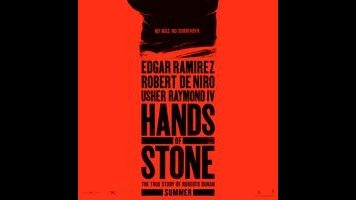The illegitimate son of an American serviceman, Durán grew up in a slum, going on to become the best lightweight boxer in the history of the sport, and subsequently earning world champion titles as a welterweight, light middleweight, and middleweight. Using the riots and social stratification of his childhood as a broad low-rent Dickensian backdrop, Hands Of Stone presents him as a rough-and-tumble folk hero who woos fair-haired beauty Felicidad (Ana De Armas) and then takes on the world—or at least the world of boxing circa the 1970s and early 1980s—with the help of his thoughtful American trainer, Ray Arcel (Robert De Niro with a Lyndon B. Johnson hairline).
Ramírez and De Niro, who previously played quarrelling former in-laws forced to share a basement in Joy, have a natural chemistry that could probably sustain a movie on its own. (One of this film’s more inspired omissions is their characters’ first meeting; they simply fall into place.) But their relationship isn’t the center of Hands Of Stone, and it’s debatable that the movie even has one. Often skipping years at a time, Jakubowicz still feels the need to cover everything that happened in between, indiscriminately throwing Panamanian politics, the Duráns’ home life, Arcel’s marriage, crooked promoters, and an assortment of disappearing characters into the mix.
Making this seem like anything more than aimlessness would take an intensity and creative energy that Hands Of Stone can’t muster. (The perfect example would be Goodfellas, a tremendous movie that makes zero distinction between major and minor incident.) Instead, it pokes around, as though trying to fill time between the big boxing matches, which are proficiently staged, but not kinetic. Whether it’s Durán’s relationship to the father he never knew or the threat of violence from the mobsters who muscled Arcel out of boxing back in the day, everything is treated with the same lassitude. Somehow, Hands Of Stone even manages to make Don King (Reg E. Cathey) seem bloodless. It’s only when the film narrows it focus to the head games of boxing—say, Durán and Arcel’s back-and-forths or the scene where Sugar Ray pieces together how Durán tricked him before a fight—that it perks up.







































![Rob Reiner's son booked for murder amid homicide investigation [Updated]](https://img.pastemagazine.com/wp-content/avuploads/2025/12/15131025/MixCollage-15-Dec-2025-01-10-PM-9121.jpg)

